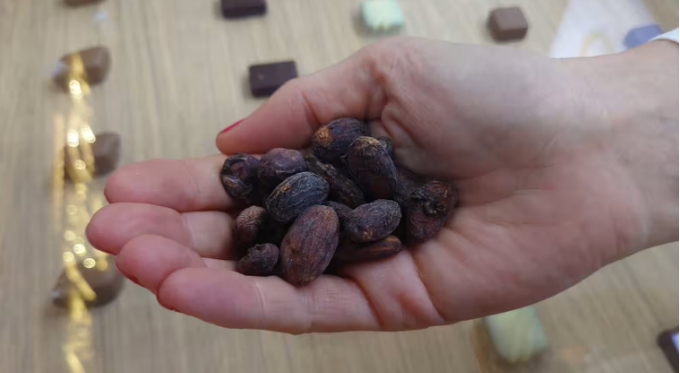December 7, 2025 | 01:22 GMT +7
December 7, 2025 | 01:22 GMT +7
Hotline: 0913.378.918
December 7, 2025 | 01:22 GMT +7
Hotline: 0913.378.918

Indonesia, Asia's largest producer of cocoa beans, has seen harvests of the raw material for chocolate halved from 2015 to 2023. Photo: Dylan Loh.
Indonesia, once Asia’s largest producer of cocoa beans, has seen its harvests halve between 2015 and 2023, a situation exacerbated by climate change and competing crops like palm oil and rubber. This has led to soaring cocoa prices and an urgent need for chocolate makers to seek alternatives to maintain supply chains.
As highlighted in a recent article by Dylan Loh for Nikkei Asia, the situation is particularly dire for manufacturers like Unigra, an Italian agro-food company based in Malaysia, which sources the bulk of its cocoa from Indonesia. According to Unigra’s Denis Cavrini, the cost of acquiring raw cocoa materials has tripled in the past year. In response, the company has had to double its prices for cocoa-based products, directly impacting confectioners throughout Asia.
While the demand for chocolate in the Asia-Pacific region continues to rise, fueled by a 3% annual growth in confectionery markets, Indonesia’s cocoa production has been unable to keep pace. This mismatch between supply and demand is pushing prices up, with Indonesian cocoa export prices nearly doubling from $3,400 per tonne in January to $6,500 by September 2024.
The primary culprit behind the decline in cocoa production is climate change, as highlighted by experts in the article. Jon Trask, CEO of Dimitra, a provider of agricultural technology to cocoa cultivators, explains how extreme temperatures, erratic rainfall, and increasing weather events are creating difficult conditions for farmers. Over the past 30 years, Indonesia’s average temperature has increased by 0.9°C, leading to changes in humidity and an increase in floods and droughts, further complicating the growth of cocoa beans.
Moreover, the competition for land between cocoa and other crops, combined with the aging cocoa plantations, adds another layer of complexity to the situation. Francisco Martin-Rayo, CEO at Helios, an agritech platform, emphasizes that the combination of climate change and declining production is forcing Asian chocolate makers to compete with buyers from Europe and the Americas, driving up costs and creating supply chain disruptions.
As the crisis deepens, some chocolate manufacturers are looking to adjust recipes and explore alternative materials. Unigra has resorted to using substitutes like palm kernel and shea butter to replace cocoa butter in chocolate production. Additionally, companies like Valrhona and Prova Gourmet have introduced alternative products, such as cocoa-flavored liquids and cocoa-free chocolate lines, aimed at helping confectioners reduce their reliance on cocoa.
Despite these innovations, experts like Lucrezia Cogliati, commodities analyst at BMI, predict that the long-term outlook for the cocoa sector remains bleak, with ongoing climate issues and market imbalances.
In response to these challenges, Barry Callebaut, a Swiss-Belgian chocolate maker, is focusing on long-term sustainability efforts. Elie Fouche, Vice President of Cocoa for Barry Callebaut, suggests that collaboration between industry players, local stakeholders, and governments will be essential in ensuring the viability of cocoa farming in Indonesia and across Asia. Sustainable farming initiatives, better agricultural practices, and the adoption of new technologies will be key to stabilizing the supply chain.
As the chocolate industry in Asia faces mounting pressures from both climate change and supply constraints, it remains to be seen how manufacturers will adapt. The future of the cocoa industry in Asia hinges on innovation, collaboration, and resilience in the face of evolving challenges.
tribune

(VAN) Despite numerous challenges, Vietnam's key seafood products are maintaining strong momentum, setting the stage for full-year exports to potentially reach USD 11 billion.

(VAN) The signing of a protocol between Viet Nam and China on the export of fresh jackfruit represents a significant milestone in agricultural trade cooperation between the two countries.

(VAN) On November 27, the Ninh Binh Department of Agriculture and Environment and the Institute for Green Growth Research organized a training course on greenhouse gas inventory for businesses.

(VAN) China’s cooking oil is suddenly flooding into India. It all comes down to a soybean surplus that Beijing doesn’t quite know what to do with.

(VAN) An Giang promotes supply-demand connections, standardizes quality and builds value chains, creating a foundation for sustainable bird’s nest development and aiming to expand exports.
/2025/11/24/5339-4-nongnghiep-075331.jpg)
(VAN) Recently, the conference on 'Sustainable Fisheries Linkage Chain - Tilapia for Export' took place in Tien Hai commune, Hung Yen province.
/2025/11/21/4309-2-153400_128.jpg)
(VAN) Green and low-emission rice is paving the way for Vietnamese rice to enter high-end markets, marking the beginning of a transformation journey toward greening and elevating the national rice brand.